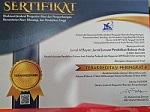Digital Flipped Learning by Using Telegram in Teaching Listening and Speaking Skills of University Students l al-Ta’lim al-Maqlub li Maharah al-Istima’ wa al-Kalam bi Istikhdam Telegram Lada Thulab al-Jamiah
Abstract
Keywords
Full Text:
PDFReferences
Abbasi, Mehdi and Fatemeh Behjat. “The Effect of Storytelling via Telegram on Iranian EFL Learners’ Speaking Complexity.” International Journal of Educational Investigations 5, no.2 (2018): 28-40.
Aghajani, Mojtaba, and Mahsa Adloo."The Effect of Online Cooperative Learning on Students’ Writing Skills and Attitudes through Telegram Application." International Journal of Instruction 11, no. 3 (2018): 433–448.
Akloby, Said Saad AL. "Using WhatsApp as a Training Tool for Arabic Language Teachers." International Journal of Education, Learning and Development 7, no .5 (2019): 92–96.
Albantani, Azkia Muharom. "Social Media as Alternative Media for Arabic Teaching in Digital Era." ALSINATUNA: Journal Of Arabic Linguistics and Education 4, no. 2 (2019): 148–161.
Albantani, Azkia Muharom, and Ahmad Madkur. "Musyahadat Al Fidyu: Youtube-Based Teaching and Learning of Arabic as Foreign Language (AFL)." Dinamika Ilmu 17, no. 2 (2017): 291–308.
Almurashi, Wael Abdulrahman. "The Effective use of Youtube Videos for Teaching English Language in Classrooms as Suplementary Material at Taibah University in Alula." International Journal of English Language and Linguistics Reasearch 4, no. 3 (2016): 32–47.
Arifani, Yudhi et al. "Individual or Collaborative Whatsapp Learning? A flipped Classroom Model of EFL Writing Instruction." Teaching English with Technology 20, no. 1 (2020): 122-139.
Ghasemi, Babak, Masoud Hashemi, and Simin Haghighi Bardine. "UTube and Language Learning." Procedia - Social and Behavioral Sciences 28 (2011): 63–67.
Haghighi, Hamzeh, et al. “Impact of Flipped Classroom on EFL Learners' Appropriate use of Refusal: Achievement, Aarticipation, Perception.” Computer Assisted Language Learning 32, no. 3 (2019): 261-293.
Hamad, Mona M. "Using WhatsApp to Enhance Students’ Learning of English Language “Experience to Share”." Higher Education Studies 7, no. 4 (2017): 74.
Handayani, Fitri. "Instagram as a Teaching Tool? Really?." in Proceedings of the Fourth International Seminar on English Language and Teaching (ISELT-4) (2016): 320–327.
Heidar, Davood Masshadi, and Maryam Kaviani. "The Social Impact of Telegram as a Social Network on Teaching English Vocabulary among Iranian Intermediate EFL Learners (Payam Noor Center)." 7, no. 23 (2016): 65–76.
Hilman, Ari. "The Effectiveness of Using Instagram in Developing Students’ Descriptive Text Writing." JALL: Journal of Applied Linguistics and Literacy 3, no. 1 (2019): 31–44.
Jalili, Shahriar, Hamidreza Khalaji and Hossein Ahmadi. "Vocabulary Learning in the Mobile-assisted Flipped Classroom in an Iranian EFL Context." Teaching English with Technology 20, no. 4 (2020): 82-95.
Kazu, İbrahim Yasar and Cemre Kurtoğlu. “Research of Flipped Classroom based on Students’ Perceptions.” Asian Journal of Education and Training 6, no. 3 (2020): 505-513.
Li, Voyce. "Social Media in English Language Teaching and Learning." International Journal of Learning and Teaching 3, no. 2 (2017): 148–153.
Moleong, Lexy J., Metodologi Penelitian Kualitatif. Bandung: PT. Remaja Rosdakarya, 2005.
Rahimi, Nik Mohd, Nor Azhan, Wan Normeza, and Harun Baharudin. "Students’ Feedback towards Using Facebook in Learning Arabic Language." Asian Social Science 11, no. 8 (2015): 170–174.
Reena Mittal. "Use of Technology in English Language Teaching: Is It Helping Students and Teachers?." in The Asian Conference on Arts & Humanities (2015).
Sah, Pramod Kumar. ‘“Let’s Tweet to Learn English”: Using Twitter as a Language Tool in the ESL/EFL Classroom." Language amd Literature 2, no. 1 (2015): 10–17.
Salehpour, Farzaneh. "The Effect of Using Telegram Instant Messaging Application on Listening Comprehension Skill among Iranian Intermediate EFL Students." International Journal of Educational Investigations 5, no. 3 (2018): 79–91.
Shirinbakhsh, Salva, and Fateme Saeidi. "The Effectiveness of Telegram for Improving Students ’ Reading Ability." Journal of Applied Linguistics and Language Research 5, no. 4 (2018): 118–129.
Shyamlee, S, and M Phil. "Use of Technology in English Language Teaching and Learning: An Analysis." in International Conference on Language, Medias and Culture 33, no. 1. (2012): 150-156.
Tang, Tao et al. "Efficiency of Flipped Classroom with Online-based Teaching under Covid-19.” Interactive Learning Environments (2020): 1-12.
Tawil, Hanan. "Enhancing Language Learning Through Technology." Journal Of English Language Teaching 7, no. 2 (2019): 1–18.
Xodabande, Ismail. "The Effectiveness of Social Media Network Telegram in Teaching English Language Pronunciation to Iranian EFL Learners." Cogent Education 4, no. 1 (2017).
Wardhono, Agus and Stephen Spanos. “Assessing English Speaking and Listening Skills with the Mobile Application Telegram.” Indonesian EFL Journal:Journal of ELT, Linguistics, and Literature 4 no, 2 (2018): 147-174.
DOI: http://dx.doi.org/10.24042/albayan.v14i1.11233
Refbacks
- There are currently no refbacks.
Copyright (c) 2022 Jurnal Al Bayan: Jurnal Jurusan Pendidikan Bahasa Arab
License URL: https://creativecommons.org/licenses/by-sa/4.0
Editorial Office:
Jurnal Al Bayan: Jurnal Jurusan Pendidikan Bahasa Arab, Arabic Education Study Program, Faculty of Education and Teachers Training, Unversitas Islam Negeri Raden Intan Lampung
Jl. Endro Suratmin 1 Sukarame, Bandar Lampung 35131-Indonesia
e-mail: jurnalalbayan@radenintan.ac.id
http://ejournal.radenintan.ac.id/index.php/albayan/index
Jurnal Al Bayan: Jurnal Jurusan Pendidikan Bahasa Arab is licensed under a Creative Commons Attribution-ShareAlike 4.0 International License. p-ISSN 2086-9282 | e-ISSN 2549-1229









